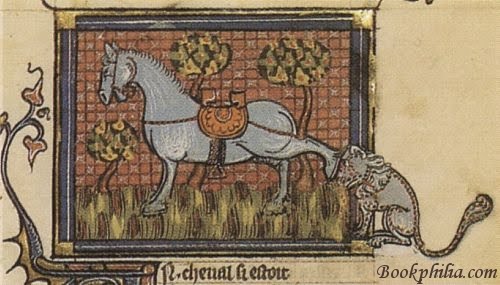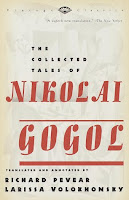William Shakespeare: Of course you are, dear.
Bookphilia: Thank you. Will, you're looking a little...green. Are you sure you're up for this interview?
WS: Well, yesterday was Shakespeare Day, and it was very busy what with all the poetry readings and the quoting and the dressing up in tights and getting infested with a good case of lice-
B: How very authentic! I was trying out lead-based make-up and hoping my hair would start to fall out so I could don a red periwig like Elizabeth I's but apparently it takes longer than a day for it to work. Also, I was trying to find someone to lace up my stays and help me properly position the bumroll over my petticoats but-
WS: I like to dress up too, preferably as a boy playing a girl disguised as a boy, but please, not so loud....I actually have a huge hangover right now and my head is killing me. Shakespeare Day is a serious party night. *Looks even greener*
B: Will, you were...drunk? But you're...the Bard. Is what Marlowe said about you being overly fond of the ale true..?
WS: Well, sure, everyone loves the beer bong.
B: *Sigh*
WS: What's your problem? You don't imagine that geniuses like moi go home early and think of puppies and God do you? My work was real and true and I made it so by wallowing in the dirt with the vermin on the street-
B: !!!
WS: Er, by keeping it real...man?
B: I can't believe you - are you a...a...a POSER?
WS: Poser? Who're you calling poser? I'll kick- Ahem. YOU DO ME WRONG TO TAKE ME OUT OF THE GRAVE! THOU ART A SOUL IN BLISS BUT I-
B: You are a total disaster. And think I love you more for it. I love that underneath all our culture's striving to justify its idolization of you as the hottest literary shit that ever was or could be, the way it tries to extract serious biography from your extant laundry lists, and continues to try to prove that while every other Renaissance playwright collaborated you were really a "pure" writer, you're just a twitchy, awkward nerd like everyone else.
Christopher Marlowe: Speak for yourself, tart. You and Will may be lumps, but I'm more glam than the love child of RuPaul and Coco Chanel.
WS: Kit, get lost! Isn't it bad enough that you put poppers in my toasted cheese last night - now you have to hijack my interview! Hie thee hence, minion!
*Marlowe disappears*
B: How did you do that? You didn't even need to use your laser eyes!
WS: As Marlowe is one of my characters, I can do anything I like with him.
B: Wait, what?
WS: As I've pretty much been elevated to deity status, I can do anything. Which means this interview is over.
*Bookphilia disappears*
WS: Don't worry, she'll be back, whether you will or no.
And then the moon, like to a silver bow
New-bent in heaven, shall behold the night
Of
Christ, I can't believe the things I'll do for money these days. *Shuffles off*







